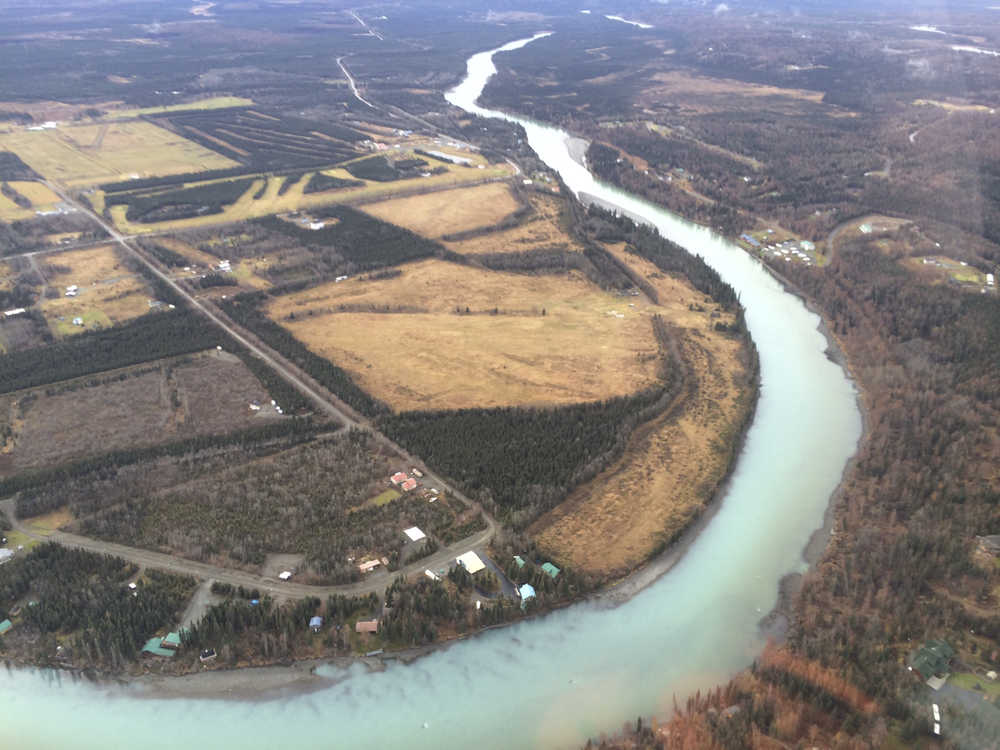Editor’s note: A previous version of this story listed the River Ranch property as being homesteaded by Eugene and Della Hansen. It was not. Glen and Bertha Moore homesteaded the property, which the Hansen’s later purchased.
First, it was a homestead for long-time Alaskans Glen and Bertha Moore. They sold it to Eugene and Della Hansen. Then, funds from the Exxon Valdez oil spill were used to buy and close the riverfront parcel along Funny River road. Now, Alaska’s Department of Natural Resources and Fish and Game are asking the public to weigh in on potential changes to the 146-acre parcel which could result in a new public access spot to the Kenai River.
A public scoping meeting, to be held in Soldotna on Tuesday, will give the community a chance to weigh in on potential changes to the parcel which some neighbors have suggested would make a good spot for a boat launch and campground. Others have asked for the bank to be re-opened for fishing in an area known as a good sockeye salmon hole.
Funny River resident Ray Price, who lives near the area known by the state as the River Ranch property, said that residents in Funny River had approached their Chamber of Commerce asking when the property would be developed.
The property is in an area of the middle portion of the Kenai River that doesn’t have many public access points. Morgan’s Landing is close by to the south, but it is located on the other end of the river — while the closest public access uprive of the parcel is several miles away.
“It just sits here and nothing is happening to it and I just feel that people out here would benefit because we’re getting more people out here in Funny River all of the time. It would give some people access to the river,” Price said.
When the state bought the land from the Hansens, the area was closed to bank fishing under a conservation easement that prohibits fishing within 10 feet of the waterline from July 1- August 14.
Price said he’d like to see it opened for bank anglers again.
“A lot of people used to fish there,” he said. “The minute (the state) bough it, they closed the whole bank area. You’re not even supposed to land a boat on the river bank.”
Price said the anglers have been losing access to bank fishing along the river for years and he hoped the state would be able to work with residents to open more of it up to public use. The Hansen still live on the property as caretakers. State Parks Kenai Peninsula Area Superintendent Jack Blackwell said the couple’s contract had just been renewed for the 2015 season.
“We can work around them,” Price said. “This is a project that’s going to take several years, so it won’t bother them while they’re still living there.”
Currently, the River Ranch property is co-managed between Fish and Game and the Department of Natural Resources’ Division of Parks.
“It’s not like we’re actively doing anything there, we’re just monitoring the area,” Blackwell said.
Last year, residents in Funny River put in a legislative request to fund a planning process and the legislature allocated $35,000 toward the effort.
“We formed a planning team with DNR and Fish and Game staff and will be starting the planning process this month,” Blackwell said.
Staff will hold two planning meetings to get ideas and input from users, then prepare draft concept plans based on the public comments and information gathered by the planning team.
The public will then be invited to an open house to comment on the draft concepts.
Once a site plan is approved, if changes to the property are warranted, then the agencies will have to consider funding.
Any improvements would be funded through a capital request to the state, so it could take some time to develop any plans.
Currently, Gov. Bill Walker’s capital budget for 2015 does not contain any capital funds for state parks.
Another issue that could come up is the bank closure.
Fish and Game Area Management Biologist Robert Begich, who is a member of the planning team, said reopening the area could be complicated.
“We don’t know which way the fish is going to flop on that closure,” he said.
Alaska’s Board of Fisheries would have to repeal the closure. The board meets once every three years on Kenai Peninsula fisheries issues — its next meeting on the area isn’t scheduled until 2017.
Despite the regulatory and economic hurdles, Blackwell said the project was an interesting one to pursue.
“What’s unique about this process is we’re starting from scratch — that’s pretty exciting to be able to say ‘O.K. We’ve got some parameters to work in but otherwise the sky is the limit,’ what do folks want to see out here?”
Reach Rashah McChesney at rashah.mcchesney@peninsulaclarion.com

